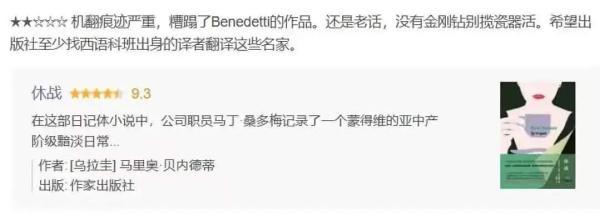summary
Zhongqing commented
On March 16, when Douban user Gao Han made a "two-star bad review" for the newly published Spanish translation of "Truce", she probably would not have thought that this small matter of casual action would bring her great trouble in the near future. At that time, Gao Han, who studied Spanish in college, found that the translation level of the book was far lower than expected after reading "Truce", so he left such a comment in Douban: "The traces of machine turning are serious, and the author's work is wasted, or the old saying, there is no diamond diamond to do porcelain work." ”
It is reasonable to say that this text left by Gao Han is just an ordinary complaint about the level of translation, and among the many "bad reviews" made by Douban netizens, it is not how intense. However, after the translator of the book, Han Ye, saw this comment, he felt that he had been greatly insulted, claiming that the other party's mention of "machine translation" was a "personal attack" on himself.

If the matter ends here, it is just a verbal dispute, harmless, but after that, a netizen A, who claimed to be a friend of Han Ye, actually reported the matter directly to the school where Gao Han was studying, saying that Gao Han attacked the translator "in the form of slander and fabricated facts", asked the school to put pressure on him, and said that his approach was to "save the runaway students". Finally, under the pressure of reporting, Gao Han deleted his bad review on March 27 and publicly issued an "apology statement" on the matter.
For the practice of a certain A to pressure bad reviewers through reporting, many netizens could not see it, so the beginning and end of this incident was quickly sorted out by enthusiastic netizens and exposed to more media platforms. Netizens' sympathy for Gao Han and disdain for whistleblowers quickly made the matter rush to the hot search and triggered a lot of discussion. Han Ye, who was originally the "object of apology", was also pushed to the cusp of public opinion together with the whistleblower A.
Douban Reading has always been one of the most important book review platforms in China, and its database contains millions of books. For more than a decade, the ratings and comments left by netizens on these books can be said to be vast. For the advantages of various books, netizens never hesitate to praise, and for some books with hard injuries, netizens will not be merciful when giving bad reviews. This kind of "praise and bad reviews flying together" scene is what a normal book review platform should look like.
Among them, for translated works, the standard for netizens to score is naturally linked to the quality of translation. When the reader sees some translation that cannot even be translated smoothly, it is normal to want to criticize or complain. In this case, the translator is ashamed and angry just because of the criticism of the reader, and regards the evaluation of the work by others as a "personal attack" on himself, which is a great loss of grace in itself. In contrast, A regards Gao Han's bad review behavior as "slander" and "fabricated facts", and tries to force the other party to apologize in a pressured manner, which is undoubtedly absurd.
Judging from the reaction of public opinion, in the face of this public case between Gao Han, Han Ye and A, most netizens are on the side of safeguarding the "bad evaluation rights" of readers. However, some netizens believe that Han Ye's statement is not unreasonable, and "serious traces of machine turnover" do have the suspicion of attacking others and not abiding by professional ethics. In this regard, if this sentence is extracted from the context of literary criticism, Han Ye can indeed forcibly understand it as a "personal attack" on himself. However, douban reading's book review area is originally a literary and art criticism platform, and it should have a broader tolerance for readers' negative comments.
Just look at the comment area of those translations with poor translation level, you will find that "the traces of machine translation are serious" is only a euphemism for "bad translation", and the reader thinks that a work has "machine translation traces", which can only mean that the level of the translation will make the reader feel this way, and it is not equivalent to the reader making a categorical accusation against the author. The translator's criticism of the translation is mistakenly grafted onto his own personality, which is both unconscionate and immature. I think that in those years, there were later generations in the translation industry who unceremoniously criticized Yang Dai's translation of "Don Quixote", and after Yang Dai saw the criticism, he not only did not get angry, but said: "The courage to point out mistakes is precisely the positive trend of the translation industry, not the crooked wind." With a gentle and generous attitude, he responded to the criticism of the other party on a case-by-case basis. As a creator, only by facing the reputation and criticism calmly can it be regarded as true self-confidence, and readers also need more open comment space, so as to make the cultural market more prosperous.
Written by Yang Xinyu
Produced by China Youth Daily and China Youth Network
Source: CYG Review